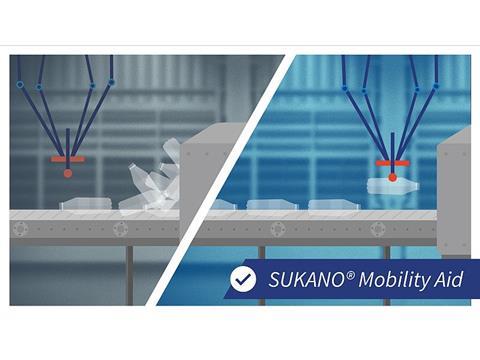
Sukano has announced the launch of a new mobility aid additive masterbatch for Injection Stretch Blow Molded (ISBM) PET bottles. This new additive masterbatch allows bottle makers and brand owners to run their conveyor-belt systems and production robots without the need for a spray coating.
Bottles must rotate freely as they pass through the production conveyor, as forced rotation caused by friction can lead to a blockage on the line. The new SUKANO® Mobility Aid solution, believed to be the first commercially available for this application, is provided as a solid PET masterbatch that is blended with virgin PET or RPET material during molding or processing. Even at low concentrations, the masterbatch disperses consistently through the PET material, reducing its coefficient of friction (COF), and modifying the surface texture with a microstructure.
Benefits of a masterbatch mobility aid over spray coatings
This new masterbatch produces a silicone-like mobility aid effect in PET material, yet has been engineered to preserve material clarity with minimal impact on haze. It is well suited to clear, translucent, and colored bottles produced for personal care, household and cleaning, cosmetics, as well as food and beverage applications. It is also widely applicable, as PET material containing the new masterbatch can be run on existing ISBM bottle production equipment without modification.
Sukano is currently assisting a customer in the U.S. optimize its production process. "Our customer, a key and leading global player in the consumer goods industry, reported that PET bottle mispicks by their production robot decreased sixfold when using our SUKANO® Mobility Aid masterbatch," stated John Price, director of technology and operations in the U.S.
The consistency and even distribution of the masterbatch lead to improved performance. The additive masterbatch preserves secondary processing steps that require adhesion, like labelling and printing. It also helps eliminate the cost and cleaning requirements associated with spray coatings, which leave a waxy residue on bottles and packaging equipment that must be removed through regular cleaning. Additionally, the SUKANO® Mobility Aid masterbatch avoids the potential risk of microbiological contaminations of bottle surfaces by aqueous-based coatings, which may require additional additives or application in a clean-room environment.
Expertise drives innovation
Significant effort was needed to engineer a product that combined the necessary properties with good thermal stability and performance-enhancing benefits to preserve material clarity and transparency. To develop the new PET additive masterbatch, Sukano leveraged its over 30 years of experience with masterbatches for film extrusion in packaging applications into the bottle packaging PET application and broadened its expertise in this field."SUKANO® Mobility Aid offers a valuable and safe alternative for bottle makers who, until now, have had to apply spray coatings to PET preforms and bottles to manage the production problems associated with ISBM production," said Michael Kirch, global head of R&D.
"Bottle makers and brand owners can now run their conveyor belts without interruption and minimize the mispicks by production robots, thereby improving productivity and maximizing yields, allowing the highest efficiency rates. Our high-performance masterbatch technology is applicable to any conveyor system," Kirch added.
Circularity as a decisive design criterion to Sukano’s products placed in the market
PET recyclability is essential in an increasingly environmentally conscious world — and Sukano's innovative mobility aid is formulated according to the European PET Bottle Platform (EPBP) guidelines. These enable the industry to innovate and bring new PET bottle packaging solutions to the market without disrupting the existing clear PET recycling value chain, with special focus on bottle-to-bottle recycling.
The company is keen to point out that it is firmly committed to achieving the concept of a "circular economy," and as such is an active member of the Association of Plastic Recyclers (APR) and Petcore Europe, which recently joined forces with Plastics Recyclers Europe (PRE) to create the Global Plastics Outreach Alliance and publish a globally harmonized definition of plastics recyclability. The new mobility aid supports the PET value chain to keep and further enhance its circularity goals to meet the voluntary pledge of exceeding the Plastics Strategy targets for recycled PET rates by 2025.













